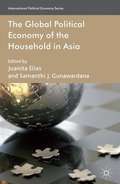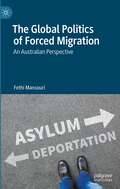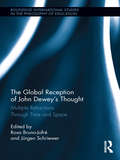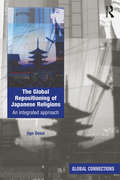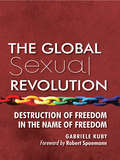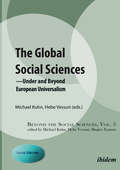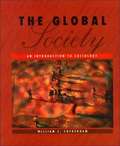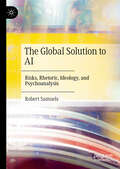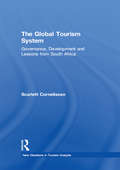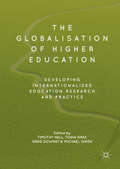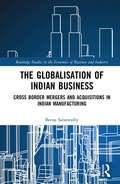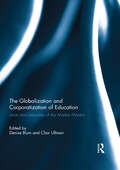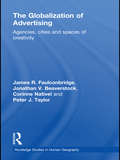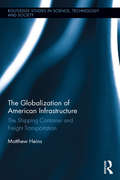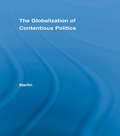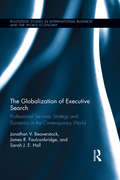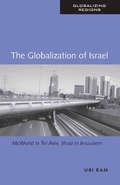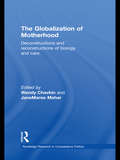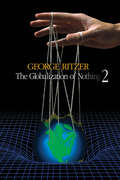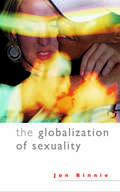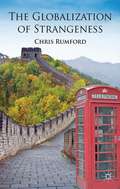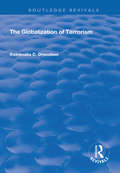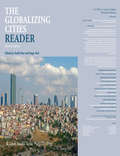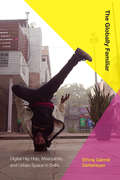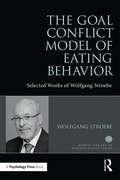- Table View
- List View
The Global Political Economy of the Household in Asia
by Juanita Elias Samanthi J. GunawardanaThe household has traditionally been neglected in studies of Asian political economy. While there is an emergent literature that looks at this relationship, to date, it is fragmented. The contributors consider how the household economy has increasingly been incorporated into development planning and policy making within both states and multilateral development agencies. They examine the social consequences of the tendency to view households as marketizable spaces, and explore how the household economy relates to broader structures of industrial production in the region. With case studies on Singapore, Malaysia, Sri Lanka, India, Japan, South Korea, Vietnam and China, they provide a comprehensive picture of the centrality of the household economy to ongoing processes and struggles associated with the continuous economic transformation of the region.
The Global Politics of Forced Migration: An Australian Perspective
by Fethi MansouriThis book focuses on the socio-political problems that emanate from Western states' harsh deterrence policies in their responses to refugee crises. Using Australia’s own policy as a lens, it examines the ways in which isolated and separatist reactions not only deny protection and basic human rights for asylum seekers but also do nothing to address structurally enduring push factors. Reflecting on a range of interconnected issues in migration research and asylum policy, this book draws on multidisciplinary insights and a mixed methodology to critically examine current assumptions underlying refugee policies both in Australia and internationally.
The Global Reception of John Dewey's Thought: Multiple Refractions Through Time and Space (Routledge International Studies in the Philosophy of Education)
by Rosa Bruno-Jofré Jürgen SchriewerThis volume explores the reception of John Dewey’s ideas in various historical and geographical settings such as Japan, China, Argentina, Mexico, Chile, Spain, Russia, and Germany, analyzing how and why Dewey’s thought was interpreted in various ways according to mediating local discursive and ideological configurations and formations.
The Global Repositioning of Japanese Religions: An integrated approach (Global Connections)
by Ugo DessiThe Global Repositioning of Japanese Religions: An Integrated Approach explores how Japanese religions respond to the relativizing effects of globalization, thereby repositioning themselves as global players. Organized around concrete case studies focusing on the engagement of Japanese Buddhism, Shinto, and several new religious movements in areas such as ecology, inter-religious dialogue, and politics, this book shows that the globalization of Japanese religions cannot be explained simply in terms of worldwide institutional expansion. Rather, it is a complex phenomenon conditioned by a set of pervasive factors: changes in consciousness, the perception of affinities and resonances at the systemic and cultural levels, processes of decontextualization, and a wide range of power issues including the re-enactment of cultural chauvinism. The author investigates these dynamics systematically with attention to broader theoretical questions, cross-cultural similarities, the definition of religion and the perils of ethnocentrism, in order to develop his Global Repositioning model, which constitutes an integrated approach to the study of Japanese religions under globalization. An empirically-grounded and theoretically-informed study of the effects of global trends on local religions, this book will appeal to scholars and students with interests in globalization, religious studies, Japanese studies, Hawaii, sociology, anthropology, and ecology.
The Global Sexual Revolution: Destruction of Freedom in the Name of Freedom
by Gabriele Kuby Robert Spaemann James Patrick KirchnerThe core of the global cultural revolution is the deliberate confusion of sexual norms. It is the culmination of a metaphysical revolution as well--a shifting of the fundamental ground upon which we stand and build a culture. Instead of desire being subjected to natural, social, moral, and transcendent orders, the identity of man and woman is dissolved, and free rein given to the maximum fulfillment of polymorphous urges, with no ultimate purpose or meaning. Gabriele Kuby surveys gender ideology and LGBT demands, the devastating effects of pornography and sex-education, attacks on freedom of speech and religion, the corruption of language, and much more. From the movement's trailblazers to the post-Obergefell landscape, she documents in meticulous detail how the tentacles of a budding totalitarian regime are slowly gripping the world in an insidious stranglehold. Here on full display are the re-education techniques of the new permanent revolution, which has migrated from politics and economics to sex. Kuby's courageous work is a call to action for all well-meaning people to redouble their efforts to preserve freedom of religion, freedom of speech, and the freedom of parents to educate their children according to their own beliefs. "Mrs. Kuby is a brave warrior against ideologies that ultimately result in the destruction of man."--POPE BENEDICT XVI "As the carnage of untrammeled sexual license piles up in cultures that have embraced sexual revolutionary ideology, we need the kind of sober and thoughtful analysis Gabriele Kuby provides. Her work will help readers understand that false visions of freedom are highways to slavery, and that true freedom is to be found in self-mastery and virtue."--ROBERT P. GEORGE "Gabriele Kuby maps the topography of horror that sex unleashed from the moral order visits upon any society that allows it. She also offers a strong, much-needed dose of moral realism that offers a way out of an otherwise totalitarian result."--ROBERT R. REILLY
The Global Social Sciences: Under and Beyond European Universalism (Beyond the Social Sciences #3)
by Michael Kuhn Hebe Eds. VessuriThe European social sciences tend to absorb criticism of their approach and re-label it as a part of what the critique opposes; thus criticism of European social sciences by subaltern social sciences, their 'talking back,' has become a frequent line of reflection. The relabeling of the critique of the European approach as a critique from 'Southern' social sciences of 'Western' social sciences has in effect turned 'Southern' as well as 'Western' social sciences into competing contributors to the same 'globalizing' social sciences. Both are no longer arguing about the European approach to social sciences but about which social thought from which part of the globe should prevail. If the critique becomes a part of what it opposes, one might conclude that the European social sciences are adaptable and capable of learning. One might, however, also raise the question whether there is anything wrong with the criticism of the European social sciences, or, for that matter, whether there is anything wrong with the European social sciences themselves. The contributions in this book discuss these questions from different angles: They revisit the mainstream critique of the European social sciences, and they suggest new arguments criticizing social science theories that may be found as often in the 'Western' as in the 'Southern' discourse.
The Global Society: An Introduction to Sociology
by William C. CockerhamThis is an introductory text to sociology which presents sociology as a way of understanding the world, not just individual societies. With a comparative focus, it de-emphasizes US society in favour of global sociology.
The Global Solution to AI: Risks, Rhetoric, Ideology, and Psychoanalysis
by Robert SamuelsThis book interrogates the notion that artificial intelligence may represent a threat to the world because it lacks both empathy and reason and suggests that - if we do not intervene to limit and control AI - we are at risk of being overtaken by machines, which are not aligned with human ethics and values. To outline how we should counter the worst tendencies of automated intelligence, we must first understand the roots of morality and reason and why we have been misunderstanding the fundamental difference between humans and computers. Moreover, by critiquing the rhetoric and ideology of AI proponents, we can gain a clear understanding of the need to regulate our machines on a global basis through global treaties. Turning to Freud&’s theories of empathy and reason from his Project for a Scientific Psychology, this book outlines why the human mind is different from AI, and why this difference is important to recognize.
The Global Tourism System: Governance, Development and Lessons from South Africa (New Directions in Tourism Analysis)
by Scarlett CornelissenFocusing on the political economy of the international tourism sector in the era of globalization and its impact in developing contexts, this book employs a case study analysis of South Africa to assess how international tourism as a global system of trade, production, exchange and governance plays out in developing countries. It also examines its benefits and disadvantages for these countries. Scarlett Cornelissen explores the nature and extent of global tourism production, consumption and regulation and how these bear upon developmental prospects, specifically in the South. She also highlights lessons for other developing countries about the limitations and possibilities for greater linkage to the global tourism system. The book is suitable for both scholars and practitioners interested in global tourism, international political economy, development, Africa and cultural studies.
The Globalisation of Higher Education: Developing Internationalised Education Research and Practice
by Greg Downey Timothy Hall Michael Singh Tonia GrayThis book argues that the neoliberal globalisation of higher education faces a need for recalibration. In light of increased concerns from universities in cultivating globalisation, this volume brings together a multi-ethnic and multilingual team of researchers who argue that the continued development of internationalized education now requires new research and practices. As university leaders seek to build the best programs to help students to go abroad, they can face a number of challenges – risk management, negotiating with diverse partners, designing rich experience-based learning and the hopes, fears and limitations of the students themselves. Consequently, the authors argue that changes are particularly important given the current US-centric and UK-centric structural readjustments to globalization policies across all fields of higher education and knowledge production. This multi-perspectival edited collection will appeal to students and scholars of global education, globalization and international education.
The Globalisation of Indian Business: Cross border Mergers and Acquisitions in Indian Manufacturing (Routledge Studies in the Economics of Business and Industry)
by Beena SaraswathyConsolidation activities such as mergers and acquisitions (M&As) have been one of the major strategies adopted by Indian firms to withstand global competition. M&As experienced a substantial increase in value and volume during the post-liberalization era, facilitated by the presence of foreign subsidiaries in the Indian market as well as competitive pressure on domestic firms. The increased foreign investment through M&As brought new dimensions to the fore such as the implications on technological performance, efficiency, and more importantly, competition in the Indian market. The Globalisation of Indian Business: Cross Border Mergers and Acquisitions in Indian Manufacturing provides an in-depth analysis of these issues, specifically aiming to understand whether the M&As strategies helped the firms to achieve their desired objectives in terms of improvement in technology, efficiency and market power in the context of the increase of M&As in India, using appropriate statistical and econometric techniques. The book is of additional importance in the context of the recently implemented Competition Act, replacing the thirty year old MRTP Act in India. The new Act aims to maintain competition and protect consumers’ interests without harming that of the producers’. Based on the analysis, broadly, the study cautions the regulators to rethink the efficiency defence argument and become more vigilant on the creation of monopolies. On the other side, it suggests firms should reconsider their post-merger integration strategy since consolidation has not led to a sustainable increase in market share of the surviving firms.
The Globalization and Corporatization of Education: Limits and Liminality of the Market Mantra
by Denise Blum and Char UllmanThe forces associated with globalization, whether economic or social, have conditioned the ways educators operate, and have profoundly altered people‘s experiences of both formal and informal education. Globalization, as a multidimensional, multilevel process, is unequivocally, but not exclusively, based on the economics of neoliberalism. This book chronicles new sites of tension in education that are a result of an ever-globalizing economy and its accompanying neoliberal practices in the United States, Costa Rica, and the US territories in the Caribbean. The contributions are grouped into two areas: institutionalized schooling practices and non-formal educational practices that focus on identities and language.Each chapter questions the neoliberal market mantra that education must be rebranded into a marketable product and consumed by individuals, making a complex and compelling ethnographic argument that the market mantra is bankrupt. The authors argue that globalization produces liminal subjects and leads to the destruction of social institutions like education that are essential to democratic governance. The aim of each article is to uniquely disentangle the dynamics of the process, so as to resolve the mystery of how globally inspired paradigms and policies mix with locally defined structures and cultures. In assessing globalization‘s relationship to educational change, we need to know how globalization and its ideological packaging affect schooling, from transnational paradigms, to national policies and to local practices.This book was originally published as a special issue of the International Journal of Qualitative Studies in Education.
The Globalization of Advertising: Agencies, Cities and Spaces of Creativity (Routledge Studies in Human Geography)
by Peter Taylor Corinne Nativel Jonathan Beaverstock James R. FaulconbridgeThe role of advertising in everyday life and as a major employer in post-industrial economies is intimately bound up with processes of contemporary globalization. At centre of the advertising industry are the global advertising agencies which have an important role in developing global brands both nationally and internationally. This book indentifies and addresses questions on the globalization of advertising through detailed study of the contemporary advertising industry in Detroit, Los Angeles and New York City and the way advertising work has changed in the three cities over recent years. The Globalization of Advertising draws upon previously unpublished research to unpack the contemporary structure, spatial organization and city geographies of global advertising agencies. The book demonstrates how teamwork in contemporary advertising agencies, intra-organizational power relations and the distribution of organizational capabilities all define how global agencies operate as transnationally integrated organizations. This in turn allows understanding to be developed of the role of the offices of global agencies located in the three case study cities, Detroit, Los Angeles and New York. The role of these three cities as preeminent markets for advertising in the USA is shown to have changed radically over recent years, experiencing both growth and decline in employment as a result of their position in global networks of advertising work; networks that operate in the context of a changing US economy and the rise of new and emerging centres of advertising in Asia and South America. This book offers a cutting edge overview of recent and current trends in the globalization of advertising and new insights into the way global advertising agencies operate in and through world cities. It will be a valuable resource for researchers and students studying Geography, Management and Sociology.
The Globalization of American Infrastructure: The Shipping Container and Freight Transportation (Routledge Studies in Science, Technology and Society)
by Matthew HeinsThis book gives an account of how the U.S. freight transportation system has been impacted and “globalized,” since the 1950s, by the presence of the shipping container. A globally standardized object, the container carries cargo moving in international trade, and it utilizes and fits within the existing transportation infrastructures of shipping, trucking and railroads. In this way it binds them together into a nearly seamless worldwide logistics network. This process occurs not only in ocean shipping and at ports, but also deep within national territories. In its dependence on existing infrastructural systems, though, the network of container movement as it pervades domestic space is shaped by the history and geography of the nation-state. This global network is not invariably imposed in a top-down manner—to a large degree, it is cobbled together out of national, regional and local systems. Heins describes this in the American context, examining the freight transportation infrastructures of railroads, trucking and inland waterways, and also the terminals where containers are transferred between train and truck. The book provides a detailed historical narrative, and is also theoretically informed by the contemporary literature on infrastructure and globalization.
The Globalization of Contentious Politics: The Amazonian Indigenous Rights Movement (Indigenous Peoples and Politics)
by Pamela MartinThis dissertation argues that Amazonian indigenous peoples organized via transnational networks due to the domestic blockages presented to them in their respective countires. Due to these blockages and the growing number of transnational political opportunity structures, such as national and international non-govermental organizations, multi-lateral development banks, and multinational corporation, indigenous peoples mobilized through transnational advocacy networks and eventually formed transnational social movement organizations. Through a comparative-historical analysis of five Ecuadorian Amazonian indigenous organizations, this work illustrates the processes of transnational collective action and its outcomes.
The Globalization of Executive Search: Professional Services Strategy and Dynamics in the Contemporary World (Routledge Studies in International Business and the World Economy)
by Jonathan V. Beaverstock James R. Faulconbridge Sarah J.E. HallExecutive search, headhunting, is now one of the archetypal new knowledge intensive professional services, as well as a labor market intermediary bound up with globalization. In this book, the authors examine the key actors in the process of executive search globalization – leading global firms – and offer an interpretation of the forces producing the contemporary organizational strategies of global executive search. The Globalization of Executive Search documents the forms of institutional work that have legitimated the role of executive in elite labor markets and created demand for the services of global firms; this exposes not only the changing geographies of executive search, but also how executive search has established itself as a new knowledge intensive professional service. The authors reveal how the globalization of executive search is exemplary of the processes by which a range of new knowledge intensive professional services have come to be globally recognized, approaching the heart of contemporary capitalism.
The Globalization of Israel: McWorld in Tel Aviv, Jihad in Jerusalem (Global Realities)
by Uri RamThis book focuses on how globalization is impacting contemporary Israel. It is a concise and originally argued introduction to Israel, but the author, Uri Ram, is careful to frame his analysis in a broader discussion of Israeli history and broader social currents. Focusing in particular on two defining – and conflicting – contemporary trends; one toward advanced liberal democracy with a cosmopolitan edge, and the other toward ethno-religious traditionalism and rejection of the secularism associated with market driven globalization. The cosmopolitan, high-tech driven city of Tel Aviv represents the former trend, and Jerusalem – a city increasingly dominated by orthodox Jews – represents the latter. Using Benjamin Barber's Jihad versus McWorld thesis to good effect, Ram's book will stand as an ideal introduction to contemporary Israel and its place in the world.
The Globalization of Motherhood: Deconstructions and reconstructions of biology and care (Routledge Research in Comparative Politics)
by Wendy ChavkinThe convergence of dramatic declines in birth rates worldwide, aside from sub-Saharan Africa, the rise of untrammelled global movement of capital, people and information, and the rapid-fire dissemination of a host of new medical technologies has led to the "globalization of motherhood". This book brings together research from the Global North and the Global South to illuminate how contemporary motherhood is being changed by the processes of globalization. It locates declining fertility and desire for motherhood in the context of female employment, the development of the global market in reproductive technologies, the rising transnational labour market demand for feminized carework, and changing family forms. Focusing on the impacts on women who mother- and enable others to do so- across diverse contexts, the book examines the way in which conception, gestation mothering labor and care are being mobilized across national boundaries. Bringing together demographers, sociologists, lawyers, public health and social theorists, this book will be of interest to students and scholars of globalization studies, development studies, gender studies, feminist politics, political economy, human rights, and social policy.
The Globalization of Nothing 2
by George RitzerThe Globalization of Nothing is back in a revised and completely updated edition, with an even greater emphasis on the processes of globalization and how they relate to McDonaldization. As before, this book is structured around four sets of concepts addressing the issues of: "places/non-places," "things/non-things," "people/non-people," and "services/non-services." By drawing upon salient examples from everyday life, George Ritzer invites the reader to examine the nuances of these concepts in conjunction with the paradoxes within the process of the globalization of nothing. Critical questions are raised throughout, and the reader is compelled not only to seek answers to these questions, but also to critically evaluate the questions as well as their answers. New to This Edition Features a greater emphasis on the main topic of globalization: A new first chapter offers an introductory overview of globalization and globalization theory, outlining the unique ways in which these topics are addressed throughout the text. Offers a new way to conceptualize and theorize about globalization: This edition delves into two subprocesses of globalization—"glocalization" and "grobalization." Provides a new way to think about consumer culture and globalization: New material is presented on consumer culture and its globalization as well as on the role of branding. Uses a nontechnical and accessible style with many global examples: The examples in this book are drawn from everyday life and a global consumer culture that are readily recognizable to students. Shorter and more concise in response to reviewer feedback. Intended Audience This text can be used in a variety of courses focusing on the principles of sociology, social change, social theory, globalization, consumerism, and the global economy in sociology departments as well as in related courses in departments of political science or economics. Contributor to the SAGE Teaching Innovations and Professional Development Award
The Globalization of Sexuality
by Dr Jon Binnie`Lively and engaging... the themes of the chapters are well chosen and cover areas in which several key debates have taken place' - Nina Wakeford, University of Surrey What are the relations between homosexuality, globalization and social theory? Why has the debate on globalization paid so little attention to questions of sexuality? This timely and stimulating book explores the relationships between the national state, globalization and sexual dissidence. The book focuses on several key test issues to exploit and develop analysis: · queer mobility · migration and tourism · the economics of queer globalization · queer politics of post-colonialism · the spatial politics of AIDS · queer cosmopolitanism · nationhood and sexual citizenship. The book regains an important human dimension that has been conspicuously neglected in the wider debate on globalization.
The Globalization of Strangeness
by Chris RumfordThe figure of the stranger is in serious need of revision, as is our understanding of the society against which the stranger is projected. Under conditions of globalization, inside/outside markers have been eroded and conventional indicators of 'we-ness' are no longer reliable. We now live in a generalized state of strangeness, one consequence of globalization: we no longer know where our community ends and another one begins. In such circumstances it is often the case that neighbours are the nearest strangers. Strangeness occurs when global consciousness outstrips global connectivity and this means that we need to rethink some core elements of globalization theory. Under conditions of strangeness the stranger is a 'here today, gone tomorrow' figure. This book identifies the cosmopolitan stranger as the most significant contemporary figure of the stranger, one adept at negotiating the 'confined spaces' of globalization in order to promote new forms of social solidarity and connect with distant others.
The Globalization of Terrorism (Routledge Revivals)
by Ihekwoaba D. OnwudiweThis title was first published in 2001. Terrorism is today a global problem and, as was recently demonstrated in Kenya and Tanzania, no country is immune. Terrorism occurs everywhere (villages and cities), it targets innocent people and terrorists who are ideologically opposed to one country can vent their anger against citizens of another. Addressing this crucial issue, this book examines the future of global terrorism by employing the World System’s perspectives in the explanation of terrorism and investigating the etiological determinants of international terrorism. It aims to articulate a theoretical explanation of terrorism which will assist the development of practical policies that are effective in counter-terrorism operations. The main features of the book include World System’s Theory (WST), the relevance of WST, factors affecting the definition of terrorism, structural terrorism in the WST, application of Fanon, the political dimension of terrorism ideologies, the disadvantages of ideological labels, measuring WST position and the distribution of terrorism, terrorist incidents by WST position of occurrence and WST position of target, labelling terrorism in context, powerism and anti-powerism, racial terrorism and global apartheid and the criminalization of terrorism.
The Globalizing Cities Reader (Routledge Urban Reader Series)
by Xuefei Ren Roger KeilThe newly revised Globalizing Cities Reader reflects how the geographies of theory have recently shifted away from the western vantage points from which much of the classic work in this field was developed. The expanded volume continues to make available many of the original and foundational works that underpin the research field, while expanding coverage to familiarize students with new theoretical and epistemological positions as well as emerging research foci and horizons. It contains 38 new chapters, including key writings on globalizing cities from leading thinkers such as John Friedmann, Michael Peter Smith, Saskia Sassen, Peter Taylor, Manuel Castells, Anthony King, Jennifer Robinson, Ananya Roy, and Fulong Wu. The new Reader reflects the fact that world and global city studies have evolved in exciting and wide-ranging ways, and the very notion of a distinct "global" class of cities has recently been called into question. The sections examine the foundations of the field and processes of urban restructuring and global city formation. A large number of new entries focus on the emerging urban worlds of Asia, Latin America and Africa, including Beijing, Bogota, Cairo, Cape Town, Delhi, Istanbul, Medellin, Mumbai, Phnom Penh, Rio de Janeiro, Sao Paulo, and Shanghai. The book also presents cases off the conventional map of global cities research, such as smaller cities and less known urban regions that are undergoing processes of globalization. The book is a key resource for students and scholars alike who seek an accessible compendium of the intellectual foundations of global urban studies as well as an overview of the emergent patterns of early 21st century urbanization and associated sociopolitical contestation around the world.
The Globally Familiar: Digital Hip Hop, Masculinity, and Urban Space in Delhi
by Ethiraj Gabriel DattatreyanIn The Globally Familiar Ethiraj Gabriel Dattatreyan traces how the rapid development of information and communication technologies in India has created opportunities for young people to creatively explore their gendered, classed, and racialized subjectivities in and through transnational media worlds. His ethnography focuses on a group of diverse young, working-class men in Delhi as they take up the African diasporic aesthetics and creative practices of hip hop. Dattatreyan shows how these aspiring b-boys, MCs, and graffiti writers fashion themselves and their city through their online and offline experimentations with hip hop, thereby accessing new social, economic, and political opportunities while acting as consumers, producers, and influencers in global circuits of capitalism. In so doing, Dattatreyan outlines how the hopeful, creative, and vitally embodied practices of hip hop offer an alternative narrative of urban place-making in "digital" India.
The Goal Conflict Model of Eating Behavior: Selected Works of Wolfgang Stroebe (World Library of Psychologists)
by Wolfgang Professor StroebeIn the World Library of Psychologists series, international experts present career-long collections of what they judge to be their finest pieces - extracts from books, key articles, salient research findings, and their major practical theoretical contributions. In this volume: Overweight and obesity rates have increased dramatically in most industrialized countries, even though more and more people are chronically dieting. Dieters can manage to lose substantial amounts of weight while actively dieting, but most regain it within a few years. So why do most chronic dieters have such difficulty controlling their weight and why is there only a small minority of successful dieters? To address these questions, Stroebe developed the goal conflict model of eating behavior, a social cognitive theory that attributes the difficulty of chronic dieters to a conflict between two incompatible goals: eating enjoyment and weight control. Although chronic dieters are motivated to pursue their weight control goal, most fail in food-rich environments: Surrounded by palatable food cues that activate thoughts of eating enjoyment, incompatible weight control thoughts are inhibited and weight control intentions are "forgotten". For successful dieters - probably due to past success in exerting self-control - tasty high-calorie food has become associated with weight control thoughts. For them, exposure to palatable food makes weight control thoughts more accessible, enabling them to control their body weight in food-rich environments. This book contains the key articles of a research program by Stroebe and collaborators to assess the validity of this theory. They succeeded in tracing the processes that lead from temptation to a breakdown of dieting intentions. They also demonstrated that these theoretical principles can be used to develop effective weight loss interventions. The book should be of value for all researcgers, students and clinicians involved in obesity research and treatment.
